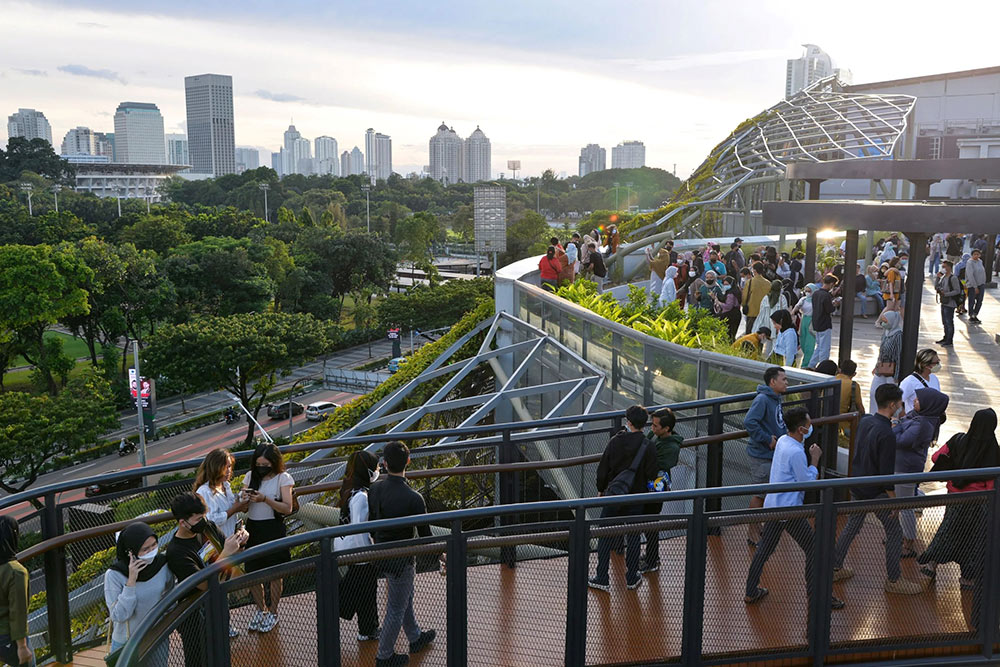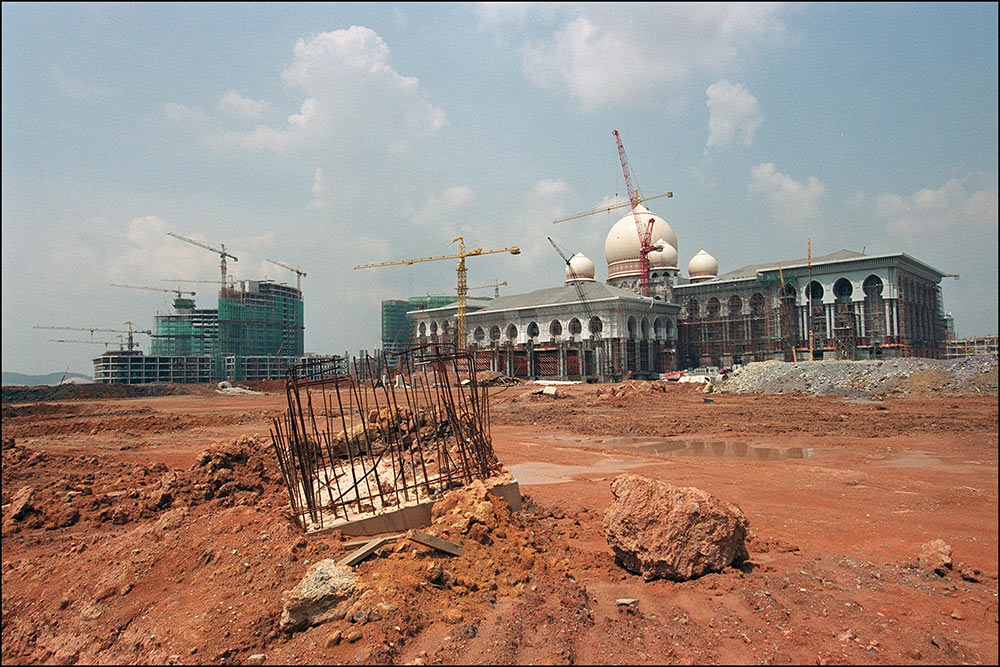
印度尼西亞的總統(tǒng)佐科·維多多在2019年公布了新首都建設計劃,,承諾打造一個清潔,、綠色、高科技的烏托邦,。新首都位于婆羅洲島,,將建成一座雨林都市,在熱帶雨林的覆蓋下,,有蜿蜒曲折的水道和設計大膽的現(xiàn)代建筑,。流暢的高速交通系統(tǒng)方便居民在城市群之間穿梭,將促進教育,、醫(yī)療和科技等高價值行業(yè)的創(chuàng)新,。
印尼總統(tǒng)又稱佐科威,在2014年當選,。當時,,他承諾將帶領印尼經(jīng)濟轉型,解決官僚主義和腐敗問題,,打造市場導向的現(xiàn)代化經(jīng)濟體系,,通過建設一流的基礎設施來提升印尼對外國投資者的吸引力。印尼的新首都被命名為“努桑塔拉”,,將耗資325億美元,,是佐科威為印尼設想的偉大未來愿景的核心。
但這只是夢想,,現(xiàn)實卻更加復雜,。在因為新冠疫情原因而長時間推遲表決之后,印尼議會在今年1月終于通過立法,,將佐科威的新首都計劃付諸實施,。但新首都建設項目的推進十分不順,。反腐敗活動人士指控政府貪污,而環(huán)保團體對新首都的環(huán)保性提出了質疑,,認為這座城市最終將像現(xiàn)首都雅加達一樣要消費大量的天然氣,。
投資者也不看好該項目。軟銀(Softbank)的創(chuàng)始人及首席執(zhí)行官孫正義最初似乎有意參與該項目融資,。他曾經(jīng)表示將為印尼的新首都投資400億美元,。但在今年3月初,,他正式放棄該計劃,,沒有給出任何解釋。新首都努桑塔拉沒有成為印尼新經(jīng)濟的象征,,反而受到了老問題的拖累,。
印尼并非第一個建設新首都的國家。巴西在1960年將首都從里約熱內(nèi)盧遷到了專門新建的城市巴西利亞,。10年后,,尼日利亞從拉各斯遷都到阿布賈。過去20年,,馬來西亞,、哈薩克斯坦和緬甸都有過遷都之舉。幾十年來,,日本一直在討論將中央政府部門搬出東京,。
問題不在于建設一座新城市,而是如何說服人們遷移,。巴西建設巴西利亞的本意是在沿海城市以外,,鼓勵內(nèi)陸地區(qū)發(fā)展。但按照一名建筑師的說法,,數(shù)十年來,,巴西利亞依舊只是荒涼的“政府辦公園區(qū)”,每到周末,,無聊的居民都會涌入里約,。緬甸龐大的新首都內(nèi)比都的占地面積比美國的紐約市大六倍,但這里幾乎無人居住,。就連議員和政府官員也選擇繼續(xù)在仰光居住,,通勤數(shù)百英里前往內(nèi)比都開會。2000年,,馬來西亞做出一個明智的決定,,將新首都布城定在距離原首都吉隆坡只有25英里的地方,使它更像是一個容納行政職能的郊區(qū),。政府已經(jīng)遷走,,但人們不必隨著一起遷移,。

印尼無法學習馬來西亞的做法,;它只能將新首都建在更遠的地方。因為有超過1000萬人口的雅加達正在下沉,。到2050年,,地面下沉和海平面上升將導致雅加達的四分之一沉入水下。此外,,雅加達所在的爪哇島處在斷層線上,,極易發(fā)生地震、火山噴發(fā)和海嘯,。
位于雅加達的獨立分析師凱文·奧魯爾克說:“基本上,,一場巨大災難的陰影目前正在籠罩著這座城市?!毙率锥嘉挥谄帕_洲東加里曼丹省,距離雅加達超過600英里,,相比之下更安全,。如果雅加達出現(xiàn)最糟糕的情況,至少政府還能夠保持正常運作,。
此外,,新首都還有經(jīng)濟和政治優(yōu)勢。爪哇島是印尼群島的17000個島嶼之一,,但卻貢獻了印尼60%的GDP,。佐科威希望新首都可以刺激其他地區(qū)的發(fā)展。他還希望轉移國家政治中心,。印尼作為一個龐大的島國,,有2.7億人口,而相距遙遠的地區(qū)之間一直存在政治分裂的風險,。東加里曼丹基本處于印尼的中心,,因此更適合作為一個團結的象征。
但如果說遷都有合理的理由,,那么實際操作起來卻困難重重,。以能源為例。雖然佐科威一直宣傳新首都保證環(huán)保,,并計劃使用水力發(fā)電廠發(fā)電,但這座基礎設施完工卻遙遙無期,。至少在初期,,新首都的電力供應將來自當?shù)貜V泛使用的煤炭和天然氣發(fā)電,。新首都可能無法避免雅加達的污染問題,,反而還會像雅加達一樣需要消耗大量的化石燃料,。雅加達的電力主要來自燃煤發(fā)電廠,。奧魯爾克稱:“我認為新首都會產(chǎn)生大量排放,尤其是在前十年左右,?!?/p>
如果新首都采用可再生能源,其電力就將來自位于北加里曼丹的卡延河水電站大壩,,承建方是中國三峽大壩的建設單位,。雖然新首都附近的景觀已經(jīng)被數(shù)十年的采礦和油棕櫚種植破壞殆盡,,但卡延河沿岸流域卻是生態(tài)敏感區(qū)。奧魯爾克表示:“在評估首都的環(huán)境影響時,,我們不能只看城市的所在地,。”
新首都的反對者對于該計劃的正當性提出質疑,。2019年,,包括礦業(yè)倡導網(wǎng)絡(Mining Advocacy Network)和趨勢亞洲(Trend Asia)在內(nèi)的非政府組織團體調(diào)查了新首都所在地的土地所有者。他們列出了一份印尼工業(yè)和政治精英名單,。其中包括佐科威政府的國防部部長和前總統(tǒng)候選人普拉博沃·蘇比安托以及他的兄弟和侄子,。由印尼海洋事務部部長控股的一家公司也在當?shù)負碛写罅棵旱V權益。
該項目的批評者擔心寡頭可能利用該項目謀取私利,。綠色和平組織(Greenpeace)印尼辦公室的阿里·龍帕斯說:“我們關心誰會從中獲利,。”龍帕斯表示,,煤電和供水合同已經(jīng)被判授給與政府關系密切的企業(yè)。普拉博沃的兄弟在2021年12月召開的新聞發(fā)布會上指出,,他早在新首都的選址確定之前就已經(jīng)在當?shù)負碛型恋?,并稱“中間沒有任何政治交易?!?/p>
另外一個問題是城市治理方式,。佐科威組建了一個名為首都城市管理局(Capital City Authority)的部門來管理努桑塔拉。批評者指責這種做法缺乏民主,。印尼加查馬達大學(Gadjah Mada University)的憲法專業(yè)講師揚塞·亞利桑那說:“政府并不關心公眾參與問題,,這種態(tài)度從城市管理結構的設計中可見一斑,。”印尼的其他省市均由民選省長和市長負責管理,,但卻沒有一位民選官員來監(jiān)督首都城市管理局的運行,。亞利桑那表示:“地方社區(qū)無法提出它們關心的問題。中央政府似乎正在建設一座沒有民主的首都城市,?!?/p>
首都項目并不是佐科威獨裁傾向的唯一例子。他在2014年當選總統(tǒng)前后判若兩人,。印尼作為東南亞人口最多,、規(guī)模最大的經(jīng)濟體,經(jīng)歷過蘇哈托將軍30多年的獨裁統(tǒng)治,。1998年,,蘇哈托政府被推翻之后,在他執(zhí)政期間暴富的寡頭們繼續(xù)把持國內(nèi)政治和軍隊,。佐科威與寡頭們不同,。佐科威出身基層,進入政界之前是一名家具制造商,,以開放協(xié)作,、有前瞻性思維的改革者聞名。
但他似乎逐漸將幫助他崛起的民主理想,,視為推行經(jīng)濟議程的障礙,。2020年,他推出了一攬子改革措施,,旨在簡化企業(yè)監(jiān)管,,為企業(yè)減負。這些法律更方便企業(yè)辭退員工和降低最低工資,,而當時與新冠疫情相關的裁員潮對印尼人民造成了嚴重影響,。有數(shù)以千計的民眾走上街頭抗議,結果被警方逮捕,。政府還逮捕了持反對立場的政治家,,取締了調(diào)查腐敗問題的部門。亞利桑那稱:“這類政府讓人不由想起新秩序,?!彼^新秩序是指蘇哈托的獨裁統(tǒng)治。
努桑塔拉可能讓佐科威再次違背民意,。隨著印尼逐漸從新冠疫情當中恢復,,很少有人支持投入數(shù)百億美元公帑建設新首都。能源成本的上漲讓政府的預算更加捉襟見肘,。但這些無法阻止佐科威,,他已經(jīng)加快了新首都的建設步伐(反對者有時將新首都稱為“Jokowigrad”),。今年3月初,佐科威到現(xiàn)場參加了開工儀式,。他希望在2024年第二個也是最后一個任期結束時,,能夠將多個政府部門和公務人員搬到新首都。馬來西亞從吉隆坡遷都到布城,,雖然規(guī)模較小,,但依舊用了10多年才完成搬遷。
如果佐科威的計劃無法成功,,他似乎正在考慮一個巧妙的變通方法:他最親密的政治盟友最近在接受采訪時討論了通過修憲讓佐科威第三次連任以完成新首都計劃的可能性,。總統(tǒng)希望新首都成為印尼新形象的象征,。但諷刺的是,,這個項目卻將印尼落后、腐敗的治理方式暴露無遺,。(財富中文網(wǎng))
譯者:劉進龍
審校:汪皓
印度尼西亞的總統(tǒng)佐科·維多多在2019年公布了新首都建設計劃,,承諾打造一個清潔、綠色,、高科技的烏托邦,。新首都位于婆羅洲島,將建成一座雨林都市,,在熱帶雨林的覆蓋下,有蜿蜒曲折的水道和設計大膽的現(xiàn)代建筑,。流暢的高速交通系統(tǒng)方便居民在城市群之間穿梭,,將促進教育、醫(yī)療和科技等高價值行業(yè)的創(chuàng)新,。
印尼總統(tǒng)又稱佐科威,,在2014年當選。當時,,他承諾將帶領印尼經(jīng)濟轉型,,解決官僚主義和腐敗問題,打造市場導向的現(xiàn)代化經(jīng)濟體系,,通過建設一流的基礎設施來提升印尼對外國投資者的吸引力,。印尼的新首都被命名為“努桑塔拉”,將耗資325億美元,,是佐科威為印尼設想的偉大未來愿景的核心,。
但這只是夢想,現(xiàn)實卻更加復雜,。在因為新冠疫情原因而長時間推遲表決之后,,印尼議會在今年1月終于通過立法,,將佐科威的新首都計劃付諸實施。但新首都建設項目的推進十分不順,。反腐敗活動人士指控政府貪污,,而環(huán)保團體對新首都的環(huán)保性提出了質疑,認為這座城市最終將像現(xiàn)首都雅加達一樣要消費大量的天然氣,。
投資者也不看好該項目,。軟銀(Softbank)的創(chuàng)始人及首席執(zhí)行官孫正義最初似乎有意參與該項目融資。他曾經(jīng)表示將為印尼的新首都投資400億美元,。但在今年3月初,,他正式放棄該計劃,沒有給出任何解釋,。新首都努桑塔拉沒有成為印尼新經(jīng)濟的象征,,反而受到了老問題的拖累。
印尼并非第一個建設新首都的國家,。巴西在1960年將首都從里約熱內(nèi)盧遷到了專門新建的城市巴西利亞,。10年后,尼日利亞從拉各斯遷都到阿布賈,。過去20年,,馬來西亞、哈薩克斯坦和緬甸都有過遷都之舉,。幾十年來,,日本一直在討論將中央政府部門搬出東京。
問題不在于建設一座新城市,,而是如何說服人們遷移,。巴西建設巴西利亞的本意是在沿海城市以外,鼓勵內(nèi)陸地區(qū)發(fā)展,。但按照一名建筑師的說法,,數(shù)十年來,巴西利亞依舊只是荒涼的“政府辦公園區(qū)”,,每到周末,,無聊的居民都會涌入里約。緬甸龐大的新首都內(nèi)比都的占地面積比美國的紐約市大六倍,,但這里幾乎無人居住,。就連議員和政府官員也選擇繼續(xù)在仰光居住,通勤數(shù)百英里前往內(nèi)比都開會,。2000年,,馬來西亞做出一個明智的決定,將新首都布城定在距離原首都吉隆坡只有25英里的地方,使它更像是一個容納行政職能的郊區(qū),。政府已經(jīng)遷走,,但人們不必隨著一起遷移。
印尼無法學習馬來西亞的做法,;它只能將新首都建在更遠的地方,。因為有超過1000萬人口的雅加達正在下沉。到2050年,,地面下沉和海平面上升將導致雅加達的四分之一沉入水下,。此外,雅加達所在的爪哇島處在斷層線上,,極易發(fā)生地震,、火山噴發(fā)和海嘯。
位于雅加達的獨立分析師凱文·奧魯爾克說:“基本上,,一場巨大災難的陰影目前正在籠罩著這座城市,。”新首都位于婆羅洲東加里曼丹省,,距離雅加達超過600英里,,相比之下更安全。如果雅加達出現(xiàn)最糟糕的情況,,至少政府還能夠保持正常運作,。
此外,新首都還有經(jīng)濟和政治優(yōu)勢,。爪哇島是印尼群島的17000個島嶼之一,,但卻貢獻了印尼60%的GDP。佐科威希望新首都可以刺激其他地區(qū)的發(fā)展,。他還希望轉移國家政治中心,。印尼作為一個龐大的島國,有2.7億人口,,而相距遙遠的地區(qū)之間一直存在政治分裂的風險。東加里曼丹基本處于印尼的中心,,因此更適合作為一個團結的象征,。
但如果說遷都有合理的理由,那么實際操作起來卻困難重重,。以能源為例,。雖然佐科威一直宣傳新首都保證環(huán)保,并計劃使用水力發(fā)電廠發(fā)電,,但這座基礎設施完工卻遙遙無期,。至少在初期,新首都的電力供應將來自當?shù)貜V泛使用的煤炭和天然氣發(fā)電。新首都可能無法避免雅加達的污染問題,,反而還會像雅加達一樣需要消耗大量的化石燃料,。雅加達的電力主要來自燃煤發(fā)電廠。奧魯爾克稱:“我認為新首都會產(chǎn)生大量排放,,尤其是在前十年左右,。”
如果新首都采用可再生能源,,其電力就將來自位于北加里曼丹的卡延河水電站大壩,,承建方是中國三峽大壩的建設單位。雖然新首都附近的景觀已經(jīng)被數(shù)十年的采礦和油棕櫚種植破壞殆盡,,但卡延河沿岸流域卻是生態(tài)敏感區(qū),。奧魯爾克表示:“在評估首都的環(huán)境影響時,我們不能只看城市的所在地,?!?/p>
新首都的反對者對于該計劃的正當性提出質疑。2019年,,包括礦業(yè)倡導網(wǎng)絡(Mining Advocacy Network)和趨勢亞洲(Trend Asia)在內(nèi)的非政府組織團體調(diào)查了新首都所在地的土地所有者,。他們列出了一份印尼工業(yè)和政治精英名單。其中包括佐科威政府的國防部部長和前總統(tǒng)候選人普拉博沃·蘇比安托以及他的兄弟和侄子,。由印尼海洋事務部部長控股的一家公司也在當?shù)負碛写罅棵旱V權益,。
該項目的批評者擔心寡頭可能利用該項目謀取私利。綠色和平組織(Greenpeace)印尼辦公室的阿里·龍帕斯說:“我們關心誰會從中獲利,?!饼埮了贡硎荆弘姾凸┧贤呀?jīng)被判授給與政府關系密切的企業(yè),。普拉博沃的兄弟在2021年12月召開的新聞發(fā)布會上指出,,他早在新首都的選址確定之前就已經(jīng)在當?shù)負碛型恋兀⒎Q“中間沒有任何政治交易,?!?/p>
另外一個問題是城市治理方式。佐科威組建了一個名為首都城市管理局(Capital City Authority)的部門來管理努桑塔拉,。批評者指責這種做法缺乏民主,。印尼加查馬達大學(Gadjah Mada University)的憲法專業(yè)講師揚塞·亞利桑那說:“政府并不關心公眾參與問題,這種態(tài)度從城市管理結構的設計中可見一斑,?!庇∧岬钠渌∈芯擅襁x省長和市長負責管理,但卻沒有一位民選官員來監(jiān)督首都城市管理局的運行,。亞利桑那表示:“地方社區(qū)無法提出它們關心的問題,。中央政府似乎正在建設一座沒有民主的首都城市,。”
首都項目并不是佐科威獨裁傾向的唯一例子,。他在2014年當選總統(tǒng)前后判若兩人,。印尼作為東南亞人口最多、規(guī)模最大的經(jīng)濟體,,經(jīng)歷過蘇哈托將軍30多年的獨裁統(tǒng)治,。1998年,蘇哈托政府被推翻之后,,在他執(zhí)政期間暴富的寡頭們繼續(xù)把持國內(nèi)政治和軍隊,。佐科威與寡頭們不同。佐科威出身基層,,進入政界之前是一名家具制造商,,以開放協(xié)作、有前瞻性思維的改革者聞名,。
但他似乎逐漸將幫助他崛起的民主理想,,視為推行經(jīng)濟議程的障礙。2020年,,他推出了一攬子改革措施,,旨在簡化企業(yè)監(jiān)管,為企業(yè)減負,。這些法律更方便企業(yè)辭退員工和降低最低工資,,而當時與新冠疫情相關的裁員潮對印尼人民造成了嚴重影響。有數(shù)以千計的民眾走上街頭抗議,,結果被警方逮捕,。政府還逮捕了持反對立場的政治家,取締了調(diào)查腐敗問題的部門,。亞利桑那稱:“這類政府讓人不由想起新秩序,。”所謂新秩序是指蘇哈托的獨裁統(tǒng)治,。
努桑塔拉可能讓佐科威再次違背民意,。隨著印尼逐漸從新冠疫情當中恢復,很少有人支持投入數(shù)百億美元公帑建設新首都,。能源成本的上漲讓政府的預算更加捉襟見肘,。但這些無法阻止佐科威,他已經(jīng)加快了新首都的建設步伐(反對者有時將新首都稱為“Jokowigrad”),。今年3月初,佐科威到現(xiàn)場參加了開工儀式,。他希望在2024年第二個也是最后一個任期結束時,,能夠將多個政府部門和公務人員搬到新首都。馬來西亞從吉隆坡遷都到布城,雖然規(guī)模較小,,但依舊用了10多年才完成搬遷,。
如果佐科威的計劃無法成功,他似乎正在考慮一個巧妙的變通方法:他最親密的政治盟友最近在接受采訪時討論了通過修憲讓佐科威第三次連任以完成新首都計劃的可能性,??偨y(tǒng)希望新首都成為印尼新形象的象征。但諷刺的是,,這個項目卻將印尼落后,、腐敗的治理方式暴露無遺。(財富中文網(wǎng))
譯者:劉進龍
審校:汪皓
When Indonesian President Joko Widodo announced his plan to build a new capital city back in 2019, he promised a clean, green, high-tech Utopia. Located on the island of Borneo, the new capital would be a rainforest metropolis featuring meandering waterways and bold, contemporary architecture nestled under a tropical forest canopy. A sleek, high-speed transport system would whisk inhabitants between urban clusters organized to support innovation in high-value sectors like education, health and tech.
Jokowi, as the president is popularly known, was elected in 2014 on a promise to transform Indonesia’s economy, long hobbled by red tape and corruption, into a modern, market-oriented system with first-rate infrastructure sure to burnish the nation’s appeal to foreign investors. Nusantara, the name chosen for the new capital, was to be the gleaming, $32.5 billion centerpiece of Jokowi’s grand vision for Indonesia’s future.
That was the dream. The reality is more complicated. After a long COVID-related delay, the Indonesian parliament in January passed legislation to put Jokowi’s plan for Nusantara into action. But the project’s momentum is faltering. Anti-corruption campaigners have made allegations of graft against the government, and environmental groups have attacked the city’s green credentials, suggesting that the new capital may end up being just as gas-guzzling as the current one, Jakarta.
Investors, too, are bolting. Masayoshi Son, the founder and CEO of Softbank, was among those who initially seemed interested in funding the project. He had floated the idea of pumping up to $40 billion into Nusantara. Earlier March, he officially backed out of the plan without explanation. Rather than being a symbol of Indonesia’s new economy, Nusantara is weighed down by old problems.
Indonesia would not be the first country to build a new capital. Brazil swapped Rio de Janeiro for the purpose-built city of Brasilia in 1960. Nigeria moved its capital from Lagos to Abuja a decade later. In the last 20 years, Malaysia, Kazakhstan and Myanmar have all done the same. Japan has debated moving central government agencies out of Tokyo for decades.
The problem isn't building a new city so much as persuading people to move there. Brasilia was meant to encourage inland growth beyond coastal cities. But for decades it remained a dull "office campus for a government," as one architect put it, whose bored inhabitants fled to Rio on the weekends. Hardly anyone lives in Naypyidaw, the colossal capital of Myanmar that occupies a site six times larger than New York City. Even lawmakers and government officials commute hundreds of miles for meetings while continuing to live in Yangon. In 2000, Malaysia made the sensible decision to locate its new capital, Putrajaya, just 25 miles from its old one, Kuala Lumpur, so that it functioned as a kind of administrative suburb. The government had moved, but people didn't have to.
Indonesia cannot follow Malaysia's example; it has to look further afield. Jakarta, home to more than 10 million people, is sinking. A combination of subsiding land and rising seas will put a quarter of the city underwater by 2050. What’s more, Jakarta is on the island of Java, which lies on a fault line that makes it vulnerable to earthquakes, volcanic eruptions, and tsunamis.
“Basically, right now you have the specter of a giant calamity,” says Kevin O'Rourke, an independent analyst based in Jakarta. East Kalimantan, the region of Borneo picked for the site of Nusantara, is more than 600 miles away and safe by comparison. If the worst happened in Jakarta, the government could at least continue to function.
The site also brings economic and political advantages. Java is one of 17,000 islands in the Indonesian archipelago, but it accounts for over 60% of its GDP. Jokowi hopes that the new city will spur growth in other regions. He also wants to shift the political center of gravity. In such a vast island chain, home to over 270 million people, there has long been a risk of political divisions between geographically distant regions. East Kalimantan lies roughly in the center of the country, which makes it a convenient symbol of unity.
But if the rationale for moving the capital is sound, the practice has been anything but. Take energy. Although Jokowi has touted Nusantara as environmentally friendly and plans to generate power from a hydroelectric plant, that infrastructure is a long way from being ready. Coal and gas—widely available in the area—will power the new capital, at least initially. Rather than breaking with the pollution of Jakarta, whose energy comes mainly from coal-fired power stations, the new capital is likely to replicate Jakarta's hunger for fossil fuels. “I think there will be quite a lot of emissions, especially in the first decade or so,” O’Rourke says.
If and when Nusantara switches to renewables, the source will be a giant dam on the Kayan River in North Kalimantan, which is being built by the same company that developed the Three Gorges Dam in China. While the landscape around the capital site itself has been decimated by decades of mining and oil-palm planting, the watershed along the Kayan River is ecologically sensitive. “When we talk about the environmental impact of the capital,” says O’Rourke, “we have to look beyond the site of the city itself.”
Nusantara's opponents suspect foul play. In 2019, a group of non-government organizations, including the Mining Advocacy Network and Trend Asia, examined who owned the land on the site of the proposed city. They came up with a who's who of Indonesia's industrial and political elite. Among the names were Prabowo Subianto, Jokowi's defense minister and a former presidential candidate, along with Prabowo’s brother and his nephew. A company controlled by Jokowi's minister for maritime affairs owns vast coal-mining interests there too.
Critics of the project fear that oligarchs are using the capital project for personal gain. “We are concerned about who is getting the benefits,” says Arie Rompas of Greenpeace's Indonesian branch. Rompas says contracts for coal power and water supply already have been awarded to industrialists close to the government. Prabowo’s brother told a press conference last December that he owned the land long before the site was chosen for the new city, and that “there have been no political deals.”
Then there is the question of how the city will be governed. Jokowi has set up a body called the Capital City Authority to run Nusantara. Critics argue that it is undemocratic. "The government is not concerned with public participation, and this is reflected in how they have designed the structure,” says Yance Arizona, a lecturer in constitutional law at Indonesia's Gadjah Mada University. Unlike other Indonesian cities and provinces, which are run by elected mayors and governors, there will be no elected officials to oversee how the authority operates. “Local communities cannot raise their concerns,” Arizona says. “It seems the government is creating a capital city without democracy.”
The capital project is not an isolated example of Jokowi's authoritarian tendencies. When he was elected president in 2014, Jokowi seemed like a break from the past. Indonesia, southeast Asia’s most populous country and biggest economy, endured more than 30 years of dictatorship under General Suharto. After Suharto was toppled in 1998 the oligarchs who had grown rich under his regime continued to dominate politics, along with the country’s military. Jokowi was different. A man from humble origins who made furniture before entering politics, he built a reputation as an open, collaborative, and forward-thinking reformer.
But increasingly Jokowi seems to view the democratic ideals that drove his rise as obstacles to his economic agenda. In 2020, he introduced a package of reforms designed to simplify regulation and reduce the burden on businesses. The legislation made it easier for companies to fire people and reduced the minimum wage, just as Indonesians were being clobbered by COVID-related layoffs. When thousands took to the streets to protest, police arrested them. The government also has jailed opposition politicians and gutted the agency that investigates corruption. “This style of government reminds people of the New Order,” says Arizona, referring to Suharto’s dictatorial regime.
Nusantara is putting Jokowi at odds with popular opinion once again. As Indonesia begins to recover from the pandemic, there is scant support for spending tens of billions of dollars of public money on the development. Rising energy costs are putting further strain on the budget. But that isn't stopping Jokowi, who has set an accelerated timeline for his new city (which his opponents sometimes call "Jokowigrad"). Earlier March, he visited the site for a ceremony to mark the start of construction. He wants several government departments and their civil servants installed there by the time his second and final term ends in 2024. Even Malaysia's modest move from Kuala Lumpur to Putrajaya took over a decade to complete.
Should Jokowi's schedule prove impossible, he appears to be considering a neat workaround: in a recent interview, one of his closest political allies discussed the possibility of changing the constitution so that Jokowi could serve a third term to see it through. The president wants Nusantara to exemplify a new Indonesia. The irony is that the project is becoming a showcase of its old, corrupt ways of governing.






